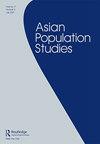Operation ‘Bring Them Home’: learning from the large-scale repatriation of overseas Filipino workers in times of crisis
IF 1.5
4区 社会学
Q2 DEMOGRAPHY
引用次数: 24
Abstract
ABSTRACT In crisis events such as wars, natural disasters and epidemics, migrant workers are among the hardest hit and most vulnerable to displacement, unemployment and the loss of income. The coronavirus pandemic has drawn attention to the role of sending states in protecting labour migrants during disruptions, particularly by returning them to countries of origin. This article highlights the understudied aspect of repatriation, which needs to be unpacked as a process involving actors, policies and practices that shape a sending state's capacity for migrant protection. Through data and document analysis, the article examines the Philippines' experience of repatriating Filipino migrant workers from host countries during crises, focusing on three points. First, institutional and legislative policies configure repatriation in the Philippines' migration system as a process of facilitated return and assistance. Second, past crisis events show how the government's large-scale repatriation efforts adapted to specific situations, but also faced challenges with operational and resource capacities. Third, repatriation in the COVID-19 crisis suggests that a critical post-arrival phase of assistance remains underdeveloped. The discussion reveals the uneven approach of the sending state, which has built a comprehensive system of labour export, but a less coordinated repatriation system and an less fortified reintegration policy.“把他们带回家”行动:从危机时期大规模遣返菲律宾海外工人中吸取教训
摘要在战争、自然灾害和流行病等危机事件中,农民工是受影响最严重、最容易流离失所、失业和收入损失的群体之一。新冠病毒大流行引起了人们对派遣国在干扰期间保护劳工移民的作用的关注,特别是通过将他们送回原籍国。这篇文章强调了遣返问题研究不足的方面,需要将其分解为一个涉及行动者、政策和做法的过程,以塑造派遣国的移民保护能力。通过数据和文件分析,本文考察了菲律宾在危机期间从东道国遣返菲律宾移民工人的经验,重点关注三点。首先,体制和立法政策将菲律宾移民系统中的遣返视为一个方便返回和援助的过程。其次,过去的危机事件表明,政府的大规模遣返工作如何适应具体情况,但也面临着行动和资源能力方面的挑战。第三,新冠肺炎危机中的遣返表明,援助的关键抵达后阶段仍然不发达。讨论揭示了派遣国的不均衡做法,该国建立了一个全面的劳动力出口系统,但遣返系统的协调性较差,重返社会政策的强化程度较低。
本文章由计算机程序翻译,如有差异,请以英文原文为准。
求助全文
约1分钟内获得全文
求助全文
来源期刊

Asian Population Studies
DEMOGRAPHY-
CiteScore
3.30
自引率
14.30%
发文量
12
期刊介绍:
The first international population journal to focus exclusively on population issues in Asia, Asian Population Studies publishes original research on matters related to population in this large, complex and rapidly changing region, and welcomes substantive empirical analyses, theoretical works, applied research, and contributions to methodology.
 求助内容:
求助内容: 应助结果提醒方式:
应助结果提醒方式:


